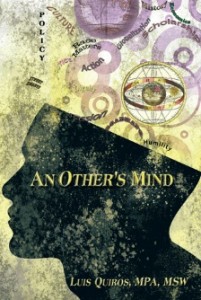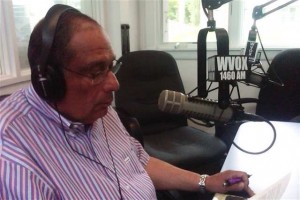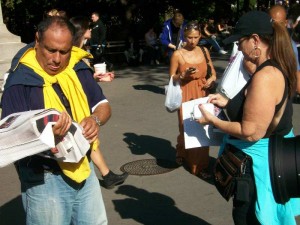Meet the Author: Luis Quiros
Growing up Latino in New York City, National Association of Social Workers member Luis Quiros, 66, knows what it is like to be the “other.” He remembers being taunted by his mostly white classmates in Catholic school.
Throughout his life Quiros, MSW, MPA, a community organizer and educator, has fought against the marginalization of himself and people who are considered “others” in American society.
Quiros, who is an adjunct professor of social policy and issues/race, class and gender at Fordham University, decided to write about his life experiences and observations on race and class in the book “An Other’s Mind.”
What was it like growing up Puerto Rican in New York City? Were you proud about your heritage? Were you treated differently?
Quiros: Whether I was living in Puerto Rico or in New York, my life was all, and remains as such, about being Puerto Rican. As children and young adults we were never told to dance around the raindrops to avoid the discrimination. If we did not succeed, it was our fault. Whether this was a form of denial or a strategy, we were not allowed to feel victimized. A passion for preserving our culture was a constant in our home. Romantic Puerto Rican, Dominican, and Cuban boleros played continually on our record player. My mother worked tirelessly to disguise the reality of our stress-filled social and economic condition. Among my most long lasting childhood memories were visiting El Barrio and La Marqueta with my mother in East Harlem’s Park Avenue to buy only the freshest produce.
Yes, I remain very proud of my heritage. And yes, I was treated differently. So differently that I never felt this nation was mine or caring about “Others” like me. Eventually those feelings gave me the motivation to contribute to a “redefining” and “reframing” necessary for this nation to move away from being the constant violator of “Others.” This nation had to be better than a good idea. The historical relevance of the civil rights movement in my life inspired me to get immersed into it and believe that “Others” would make this nation start over.
Why did you decide to go into social work? Where did you earn your social work degrees and what type of work do you do now?
Quiros: Throughout my life I had witnessed and experienced too much injustice. For too long, my experiences and that of “others” like me have been silenced and hidden. I had been socially trapped into choosing inadequate role models simply based on income successes rather than character. Making that realization, I learned that a partnership of scholarship and street smarts was necessary to create a positive channel for those offenses that were so prevalent in my life and of those I surrounded myself with.
I found that “social work” was something I practiced from a young age and in seeking more knowledge to better prepare myself in a world that assumed I would never graduate high school, I formalized and validated my actions by pursuing a master’s degree at the Hunter College Graduate School of Social Work in New York City. My concentration was in community organizing. Currently I am an adjunct professor at Fordham University and Metropolitan College in New York. I write social and political columns in Spanish for the Westchester Hispano, a Spanish publication distributed in the metropolitan area. I serve as president and representative of Padres Unidos, a group of Latino parents and students in Westchester public schools. In this capacity a lot of community organizing is required to advocate for much needed changes to the way the school district addresses the needs of Latino students and their families. I mentor future organizers and am very active in exposing unethical behavior that hits at the very heart of the issues affecting the Black and Latino communities.

What made you decide to write “An Other’s Mind”? What do you hope readers will take from the book?
Quiros: The reader, as many students who read drafts of the book, will discover that the greatest lesson I learned and hope to pass on to “Others” is that if one of us is not free, then none of us are free. Beyond the scholarship and material presented for the disciplines that deal with social issues and human rights, the book is also a channel in which I hope to continue mentoring and inspiring “Others” to join the movement toward change. In exposing the realities so many of us have faced, the importance of consciousness is emphasized and self-empowerment comes into the equation and process of gaining more knowledge. This is not simply an autobiography or memoir of the many people I have worked and interacted with, nor is it only about social and economic justice principles but a complement of both—each affecting the other—to reveal and motivate an introspective analysis of where one stands on issues affecting us all. The book appeals to those struggling with survival and the feeling that their oppression is connected to being viewed as an “Other” or “excess.” Students seeking answers to their conditions relate to the narratives in the book but also find a common denominator that leads to their empowerment. Social workers, sociologists, educators as well as law students and others searching for a justification of how ethics are often compromised in the work they do will find the book relevant to their experiences. Advocates with an understanding of their role as agents of change, will also find the information and stories very appealing and a powerful resource.
In the book you say the United States is not melting pot and colorblindness is not real. Could you explain this?
Quiros: The United States is not a melting pot because too many “Others” do not melt or desire to, and worst of all, are not invited to the process. In addition, this nation does not understand that any concept that strives to reduce the unique characteristics of cultures in actuality is attempting to continue the colonization, oppression and even genocide of “Other” communities. The dogma that we are created equal is another a myth. When it was first written or stated, women could not vote and Black people could not enter the United States and become naturalized citizens (Naturalization Law/ Act of 1790). Interracial marriages were not legal, or safe to have.
Colorblindness is not real, and is in fact dangerous, because everyone has characteristics that demand respect. It is a myth to go around pretending that you can produce or envision equality while combating otherism and propagandize sameness, as if one size fits all. In our struggle to defend our basic needs and our being viewed as an “other,” the greatest discovery for me was that race mattered. When left out of the social equation it translates to negativity, and does not allow for progress to occur. In denying ourselves a positive view of race and how our differences enhance us as a society, our basic need of human dignity is perpetually compromised and leads to greater social issues.
Are we moving toward a post racial world?
Quiros: I believe up to now, the term “racial world” is a social construct with negativity attached to it. Rather than embracing our notable differences, with an acknowledgement of the beautiful qualities of a racial group and culture, we want to move into a world where race does not matter and we can say there are no conflicts. We have all contributed to this mindset that if we eliminate the discussion of these issues than we have resolved the issues. The result has also become about moving on in our conversations, which I can agree, it’s time for action to effectuate change. However, in viewing race as a treasured part of our identity, we would not allow for a “post-racial” world where the myth of “colorblindness” prevails. In the absence of risk-taking and civil disobedience to acknowledge that the Reconstruction Era never ended, we allowed the “racial world” to prosper within the Jim Crow definition of racism. We should not strive for a “post racial” goal; what we should pursue is a society where racial differences are positives.
In the book you say our public school system is in trouble. What makes you think so and what are solutions?
Quiros: I connect the 40-year silence of civil disobedience until the Occupy Wall Street movement, and the attack of our civil liberties on a failing public school system that since then has not revealed these societal ills through literature and the dialogue of present struggles. More concrete responses are the silencing of critical thinking and exaggeration of standardized testing; the growth of our prison population; funding of public schools via the financial worth of zip codes; the patience in our country concerning the global embarrassment of too many of our politician’s ignorant comments; the influx of more intelligent mathematical and scientific minds outside of our borders; the patience of our youths in allowing this nation to being addicted to war and violence; allowing the attack on our environment for financial reasons; for the lack of knowledge demonstrated by the lack of action on issues of life’s sustainability; and the non-organizing of boycotts as corporations gain much more power than the students can ever have.
As our public schools go, so will this nation. Any solution must have as a major component the members of the neighborhood most affected by a failing public school. By failing, I do not mean by government standards. One measurement for knowing how well a public school is performing could be determined by the type of colleges that graduates are attending and their advancement from that point on. Parents must organize and connect with coalitions. The drive for excellence must include political leaders. The participant’s lead organizers must be aware that forms of civil disobedience may be utilized. Aware of their power and risks must be evident. Our children deserve a legitimate shot at life. It starts at home and in the public school.
In light of the Obama presidency and the statements of some of the Republican presidential candidates, what do you think of race relations in the United States today?
Quiros: Race relations is something that must be framed in the plurality or among the group of social issues, if one is to understand race relations. Much more often than not, when race is viewed in the singular in the United States it resorts to pure bigotry because nothing else is considered. Race does not operate as a singular issue. Neither do people who are affected by the many factors and systems carrying out the distorted views of race. One must be aware, for example, how issues of privacy and police action and power interact with race before you can proceed to verbalize an intelligent response on race relations in the United States.
President Clinton’s board on the Initiative on Race at the start of the century was chaired by Dr. John Hope Franklin, my friend and mentor, which revealed that race, would be the challenge of the next century. Dr. Franklin was right when including race in as many social dialogues as possible. Stop and frisk action by the police departments is one example. The manner in which immigrants from Latin America are treated and viewed is another. The silence of immigration reform initiatives; the significant status that corporations have achieved and their contribution to the mortgage crisis; the crowding of our prisons all have racial messages we cannot be proud of as a nation.
What can social workers do to improve race relations?
Quiros: Changes in social work to improve race relations are in demand. Unfortunately, clinical practice is too often the focus of our profession. Within this paradigm, the macro view of social issues is often missed as well as our role to mobilize people in pursuit of much needed changes. Community organizing components and strategies are viewed as “electives” in many social work programs, even at the graduate level. Faculty teaching students with a clinical concentration is not an excuse for compromising social justice and community organizing courses. I believe that most social workers understand that the injustices we witness with the consequences we observe affecting our clients have societal roots and as such it is also our role to expose these “controversies” and to serve as voices for the voiceless. The work of empowering the communities we work with should not be limited to organizers; all voices must be included in reclaiming dignity for everyone. However, where we part company is that clinicians seem to accept the premise that there must be a risk in seeking justice and our profession also has great responsibility in honoring the values we have all committed to. Moving away from community action and civil disobedience has allowed for example, race relations, among other dire social issues to become reduced to a simple discussion or forum that provide no change for the people we work with. This type of advocacy I refer to as “soft advocacy” because it is a “safe” form that only protects the practitioners and their organizations but too often sacrifices the progress of entire communities. Patience then becomes immoral in our work as agents of change.
Buy “An Other’s Mind” and learn more about Quiros at anothersmind.com.
| Leave A CommentAdvertisement
2 Comments
Leave a Comment
You must be logged in to post a comment.





We are living in a nation that has ALWAYS been exclusionary, even as it boasts to be blindingly democratic. Professor Quiros eloquently and directly points out our flawed, yet socially accepted hypocrisy. He urges the reader that in order to find one’s own freedom, it is imperative to fight for the freedom of others. His book should be required reading in every social work program in every university across the country.
My husband and I are splitting up, we are just at the beginning stages. I (gringa) am in therapy, my husband (Latino/ecuatoriano) says he is not interested. I would like to offer him the name of a latino male therapist to work through this – he probably wont do it, but I always have to try. He wants the divorce (years and years of infidelity on his part), he’s in his 70s, and I think he would benefit from some help.
Are you still practicing? And if not, is there another latino male in Brooklyn you could recommend?
Thanks,
Susan McQuade